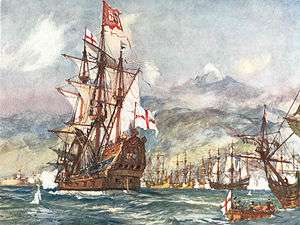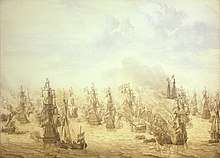HMS St George (1622)
HMS St George, sometimes written as HMS George,[1] was a 42-gun great ship of the English Royal Navy, built by Andrew Burrell at Deptford and launched in 1622.[1] By 1660 her armament had been increased to 56 guns.[1]
 HMS St George at the Battle of Santa Cruz de Tenerife | |
| History | |
|---|---|
| Name: | HMS St George |
| Builder: | Burrell, Deptford |
| Launched: | 1622 |
| Fate: | Sunk as a blockship, 1697 |
| General characteristics [1] | |
| Class and type: | 42-gun Great ship |
| Tons burthen: | 895 (Builder's Old Measurement) |
| Length: | 110 ft (34 m) (keel) |
| Beam: | 37 ft (11 m) |
| Depth of hold: | 16 ft 6 in (5.03 m) |
| Propulsion: | Sails |
| Sail plan: | Full rigged ship |
| Armament: | 42 guns of various weights of shot |

The George at the Battle of Scheveningen, 10 August 1653
St George was hulked in 1687,[1] and sunk as a blockship in 1697.
Notes
- Lavery, Ships of the Line vol.1, p158.
gollark: You can *detect* an error fairly easily if you store a hash or something, which can be way smaller than the actual data, and just have your thing self-destruct if a mismatch is found.
gollark: > …and then a bit gets flipped and all of a sudden your threshold is now 2.001% by massError correction/detection is basically a solved problem now.
gollark: Great habitats, apart from being on Mercury.
gollark: Probably. They could be really light and small, or only use the sail to very slightly supplement the ion drive occasionally. Or just be very slow.
gollark: Maybe the sail bit could also be switchable in little bits instead of the whole thing at once, for very limited steering and communication.
References
- Lavery, Brian (2003) The Ship of the Line - Volume 1: The development of the battlefleet 1650–1850. Conway Maritime Press. ISBN 0-85177-252-8.
This article is issued from Wikipedia. The text is licensed under Creative Commons - Attribution - Sharealike. Additional terms may apply for the media files.